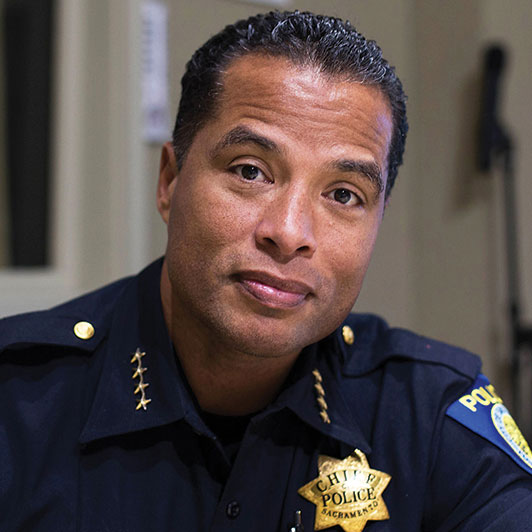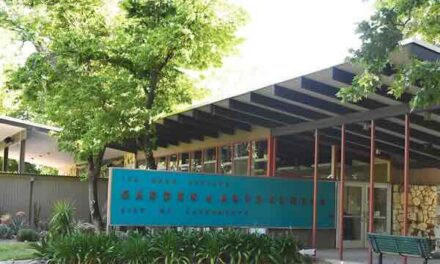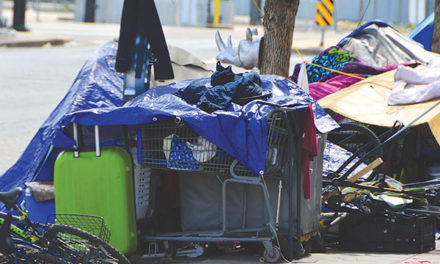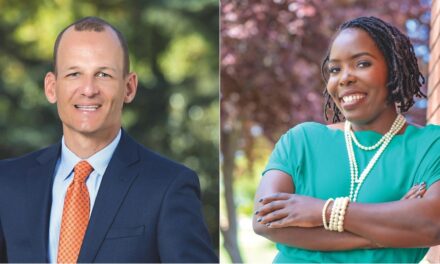Chief Complaint
Police can’t succeed without help
By Daniel Hahn
November 2020
I am a Black man, a cop and honored to be Sacramento chief of police. I hold this job at a perilous time. Countless progressive chiefs across the country, many Black, are being removed. They are collateral damage in the Black Lives Matter movement, scapegoats for a racist reality they didn’t create.
In a recent op-ed in the Bee, I discussed our police department’s response to summer protests that spread across the country. The response from retired law enforcement officials, and others, was immediate. Emails, letters, voicemails and social media posts were critical of SPD’s strategy and me personally.

Some said I was appointed chief only because I’m Black. Others said I’m childish for speaking my opinion. And I should resign because I failed to uphold my oath by not using more force with protestors. Some said Black Lives Matter brings down good Black people.
I don’t disagree with the sentiment behind Black Lives Matter. The purpose is rooted in righteous cause. Police are biased about race. But so is every other segment of American society. If anything, the Black Lives Matter target is too narrow.
Research reveals prosecutors often over-charge Black suspects. Judges often hand down more onerous sentences to Black offenders. The list of people who have contributed to unrest in Sacramento extends beyond the criminal justice system, deep into history.
For generations, the real estate industry would not sell houses to Blacks in stable White neighborhoods, depriving people of home ownership. City planners razed communities of color in the name of slum clearance. They barricaded Black and Brown people behind freeways, in government-created slums with no grocery stores but crumbling infrastructure and liquor stores on every corner. Growing up in Oak Park, I saw the results.
Unions refused to admit Black tradesmen. In factories, when Black workers were promoted or given a chance at prosperity, riots broke out. Lawmakers historically criminalized minority populations and poverty.
We can’t talk about law enforcement’s ancestry of slave patrols without recognizing that Black people were legally enslaved and not considered complete humans. Newspapers advertised rewards for their capture. In 1964, a California initiative called Proposition 14 legalized race-based discrimination when selling or renting a home. It passed in Sacramento County by 62 percent.
California has an ugly history of discrimination. We enacted laws against Native Americans, Chinese Americans and Japanese Americans and others. For generations, schools didn’t teach the complete history of the 120,000 Japanese Americans who were taken from their homes in World War II. History ignored the thousands of California Native Americans massacred in the 19th century. We were not taught about Black Wall Street, redlining, block busting, discriminatory lending practices and “Sun Down” towns. Why?
Cities somehow find ways to fund sports arenas and stadiums but can’t finance a decent mental health system, drug rehabilitation programs or affordable housing for the thousands who sleep on our streets.
These actions produce tragic consequences. Here’s one example: A 27-year-old homeless Black male, mentally ill and drug addicted, has been cited, arrested or given a notice of trespass in our city numerous times. He has been cited at least 10 times in four months for indecent exposure, attempting to light fires, threatening people, throwing himself in front of moving cars, breaking windows, blocking traffic while ranting in the streets and trespassing. Police arrest and book him or place him on a mental health hold. He is fingerprinted, cited and released, again and again.
There are hundreds of people like this poor lost soul, wandering our city. Such individuals need long-term mental health, drug treatment and stable housing. None are available.
The situation declined after the economic collapse of 2008. The pandemic intensified the problems. Services that were inadequate before have largely disappeared. The Sacramento Mental Health Center closed a decade ago.
Police are in an untenable position. However, as a city, there are ways we can improve our collective circumstances. Law enforcement leaders can be self-reflective and drive change. We can create affordable housing. We can provide mental health and drug treatment options for our most vulnerable, rather than let them languish on our streets.
We can begin to fix inequity, pain and anger by acknowledging how we got here. How can we begin to heal if we don’t know what’s wrong with us?
What can I do? I can recruit well-educated and diverse officers. Sacramento police officers must have a minimum of 60 college units. Many have bachelor’s degrees. I can ensure all officers have Implicit Bias Training and take part in relational policing activities, such as our Walk in My Shoes program. (These programs can be found on our department website at cityofsacramento.org/police, under “Transparency.”)
I have invited Stanford University, Washington State University, Center for Policing Equity, California Department of Justice and American Leadership Forum to review our department, teach implicit bias and history, evaluate training and provide recommendations on how we can better serve every segment of our community.
I can create transparency. Sacramento was the first city in our region to require police body cameras—a reform some departments have not implemented. SPD often releases footage of an officer-involved shooting within a week. Video footage is placed on our department’s website within 30 days, often sooner.
Sadly, what do we get for transparency? Mostly derision.
Sacramento police officers who seek promotions are required to read “Post Traumatic Slave Syndrome,” a book about the generational legacy of slavery. The goal is to give officers insight into the daily indignities suffered by Blacks, regardless of income, education or social status. I’ve assigned “Blindspot: Hidden Biases of Good People,” which explores unconscious biases.
Beyond firearms training and rules of arrest, we require recruits to spend a day with a resident of our challenged communities. The recruits get to walk the streets and form relationships. We invite community members on ride-alongs.
Why do we do this? An eager young recruit may never have experienced a close relationship with a Black person. When recruits are sent to protect the streets of diverse communities such as Meadowview, Oak Park and Del Paso Heights, they need to know something about those communities and their residents.
Should we defund the police? No police chief would suggest such a thing—if only because defunding disproportionately impacts the communities we must lift up.
At the same time, we can’t fail to financially support the social programs we desperately need to keep our city safe. We must provide comprehensive historical perspectives to high school and college students. We must pay for social workers and mental health staff, and build affordable housing, homeless shelters, and drug and alcohol rehabilitation facilities.
We need laws that allow someone other than police to place people suffering from acute mental distress on mental health holds longer than 72 hours. We must change personnel rules to allow more transparency when an officer is terminated. Our communities must know whether police departments hold members accountable.
Police cannot keep the peace and improve quality of life without help. Give us the help we need.
Daniel Hahn is Sacramento chief of police. He can be reached at (916) 808-0819.














